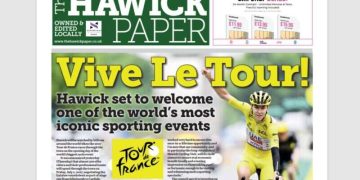
Throughout his newspaper career, Will Lewis (now Sir William, courtesy of Boris Johnson) has displayed an extraordinary knack of getting on with bosses.
It served him well as a business reporter, when he broke a succession of stories, having received several of them first-hand. Then as the Financial Times global news editor and when hired by Rupert Murdoch to run the Sunday Times’ Business News and subsequently as the youngest ever editor of The Daily Telegraph in 2006 at the age of 37.
There, the pinstripes supported him as they withstood enormous pressure from politicians and others to fire him, following his purchasing of the stolen computer disk detailing MPs’ expenses claims in 2009. And, back with Murdoch, as the executive charged with clearing up the mess caused by the hacking scandal. Lewis, it was, who led the Managements and Standards committee which handed millions of internal emails to the police which saw 16 journalistic sources jailed and 34 journalists arrested. While that hardly endeared him to fellow hacks, the move helped stave off a corporate prosecution and an impressed and grateful Murdoch made him CEO of Dow Jones, publisher of the Wall Street Journal in 2014.
Now Lewis can be accused of doing his master’s bidding again, this time at the Washington Post. Jeff Bezos, the Amazon founder and the title’s owner, is fearful, probably rightly, of what a victorious Donald Trump would do to his business empire should the Post endorse Kamala Harris. So Lewis, the CEO, has announced the paper will be staying neutral.
Given the Post’s Democrat historic leanings, not to mention its vocal criticisms of Trump, that is being hailed by Republicans as a victory for their man and a blow to Harris. Predictably, the Post’s newsroom, already opposed to the choice of Lewis, has taken the news badly. According to NPR, the Post has been hit by a tidal wave of cancelled subscriptions (some 200,000).
Deciding who to back in an election is one of those moments in charge of a newspaper that feels imbued with power and influence. Often the leader is penned by the editor themselves, such is the regard in which it is held.
In reality, of course, they are usually following the same political line as the paper has always followed and the same as that of the owner. In truth, as well, just how impactful the decision is open to doubt.
During the last UK election, the Telegraph and Mail, unsurprisingly swung behind the Tories and devoted acres of space, not to mention their leaders, to promoting Rishi Sunak, only for Sir Keir Starmer to enjoy a landslide.
Back in 1992, The Sun may have claimed “It’s The Sun Won Won It” across its front page, the morning after the Conservative victory, but that was typical, cheeky hyperbole. Doubtless The Sun’s opposition, represented by a pre-election banner picture of Neil Kinnock, the Labour leader as a light bulb and inviting the last person leaving the UK, should he win, to turn off the lights, helped, but that is all.
Readers are perfectly capable of making up their own minds, they do not need to be told how to vote. Indeed, to say otherwise is to insult their intelligence. Listing the strengths and weaknesses of the main candidates and inviting them to form their own opinion is surely a better, more grown-up approach.
Unfortunately, proprietors tend not to see it like that. For them, selecting who to support is a moment in the spotlight when they can appear omnipotent. In today’s frequently loss-making world where newspapers are concerned, it is one of the reasons they own a newspaper at all.
They enjoy the wooing by the main parties, sometimes made more out of hope than expectation. Even a less-than-full-hearted endorsement of the candidate they were always going to support can be claimed as a victory by the other side. Therefore, remaining impartial when they were definitely only going one way will be seen as a triumph by Trump supporters.
It leaves Lewis in a deep hole. It’s not true to say it will have lost him the newsroom – he never had it in the first place.
The Post’s reporters did not take kindly to a Brit being imposed upon them. Lewis had paid for a story, something forbidden under US journalistic ethics – the fact the British public had a right to know what their MPs were claiming and how much they were paying did not wash. His role in the post-hacking clear-up was also held against him. Then, came his appointment of Rob Winnett, a former Telegraph mucker, as editor of the Post. Winnett’s subsequent decision not to take up the new job, weakened Lewis still further. Whether Lewis survives remains to be seen.
There is another loser in this and that is the Post. The brand, built on the back of Watergate and the Pentagon Papers and the fierce courage it took to get them into print, has sustained a heavy blow.
Once the proud possession of a newspaper-owning family, it’s clearly reduced to playing a bit part role in its current proprietor’s universe. Bezos has got much bigger interests to concern him more than the venerable Post. It might give him kudos but not if it imperils his other investments.
Of course, Bezos will claim different. He will try to cling to the belief that the Post’s slogan, ‘Democracy Dies in Darkness’ is still intact.
To an extent he is right. All the Post did was not endorse, everyone knows how they feel, really. It’s not as if they’ve never done it before. What’s the big deal?
First, it could have been handled better, trailing in advance its likely impartiality. Second, this is the one election above all elections that the Post had to come out for the Democrats. Bezos has handed a PR gift to a man the paper’s staff and readers could never countenance.
The post Spiked Washington Post election leader leaves CEO Will Lewis in a deep hole appeared first on Press Gazette.





























